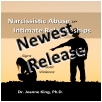"End Intimate Partner Abuse
in Your Relationship"

From the Desk of Dr. Jeanne King, Ph.D.
Dear Couple,
When people initially seek to remedy the physical, verbal and/or emotional abuse in their lives, they long to find an intervention that helps them salvage their relationship. We see this all the time, even at the police station.
Abuse survivors show up, with or without their abused children, and plead to police officers to help them stop the abuse. They say, "No, I don't want to file a complaint; I just want to end the domestic abuse."
This is natural. It is understandable. What they really want is the dream they hold, the love they once had, the family they know. They want peace and well-being, AND they want it with their intimate partners.
They reach out to law enforcement and healthcare for a remedy for the abuse that infests their intimate relationship, yet all too often all they hear is "leave your battering spouse, before the abuse spirals out of control."
While this may be the proper avenue of remedy at some juncture, once entrenched in the cycle of domestic abuse...it's usually not the first option one desires or would choose.
Accordingly, we are pleased to introduce a tried and true treatment intervention designed to help you and your partner break the cycle of domestic abuse in your relationship...And alternatively cultivate a relationship atmosphere of mutual respect, honoring and support devoid of interactional violence and victimization.
We've just met, so let me introduce myself...as you may be wondering, why listen to me?
Jeanne King, Ph.D.
I have been helping people identify, end and heal from domestic abuse for over a decade. And I serve as a consulting expert on both civil and criminal cases of intimate partner violence.
The first book I wrote on the subject, All But My Soul, became a college textbook in criminal justice. Since this time, I've published over 400 articles on identifying, ending and healing physical, emotional and verbal abuse.
I am a seasoned psychologist of 30 years. And this background gives me the benefit of understanding the psychosocial dynamics that bind abusive relationships as well as the mechanics of healing relationship abuse. Dr. Jeanne King's Full Biography
Knowing "It" from the Inside Out

But all of my knowledge about domestic abuse intervention doesn't come from the hundreds of books I have read or from the people I have helped. It also comes from the fact that I, too, lived the nightmare and carried the pain of intimate partner abuse.
So I know it from the inside out as well. And I know how hard it is to find professional help that truly understands the actual inner ache of domestic violence AND the principles of healing relationship abuse from within.
I truly understand how important it is for you to end and heal from intimate partner abuse: emotionally, physically and psychologically. And I know the benefits this will yield for you, for your spouse, and for your marriage and family.
End Intimate Partner Abuse in Your Relationship
before It Spirals Out of Control
The Intimate Partner Abuse Treatment Program is a finely tuned domestic violence treatment protocol, integrating a psychoeducational intervention promoting change for batterers and a psychotherapeutic intervention facilitating healing for domestic abuse survivors.
For the Batterer
The Intimate Partner Abuse Treatment Program provides men and women, who have been abusive in their intimate relationships, an opportunity to change their violent abusive behavior.
The intervention consists of education, support and therapeutic components that address the maladaptive use of power in relationships. The primary treatment goal is the development of new skills to facilitate non-violent and non-abusive behavioral responses with their intimate partner.
For the Victim/Survivor
The Intimate Partner Abuse Treatment Program offers healing remedies for the domestic abuse survivor. It provides the victim with the awareness of what maintains the cycle of abuse and the strategies to interrupt the insidious cycle.
Healing from domestic abuse is paramount to the treatment. Survivors completing the intervention mend their psychological scars and the emotional pain from being battered, while changing the habits of victimization.
"Thank you so very much for the tremendous help you have given along the way. Your insights have been life changing. I truly don't believe we would be where we are without your expertise and guidance. You were my last hope. And it worked." Anonymous Participant in Domestic Abuse Treatment Program
"I know how to resolve conflict in a constructive manner now without being violent or abusive." Anonymous Male Participant
"Ever since I realized what you meant by accountability, I don't mouth off at her when I'm vulnerable. We are practicing 'fair fighting.' Thank you for helping us save our family." Anonymous Male Participant
"I am stronger and happier, and people tell me they see me being myself again." Anonymous Female Participant
"I hated the way I treated my spouse, but didn't know how to do it differently. This program has given me the skills I need to make the changes." Anonymous Male Participant
"I know now that I had no right to scare her. This should be taught in high school." Anonymous Male Participant
"This is the man I thought I married. Now, I'm happy when he comes home. Being in this program was a needed miracle for us..." Anonymous Female Participant
How the Intimate Partner Abuse Treatment Program Works
This intervention is specifically designed to interrupt the cycle of domestic abuse and heal the injuries caused by intimate partner violence. Unlike traditional marital therapy, each person engages in the therapeutic process individually, as well as with their partner as a couple.
This treatment is in no way an opportunity to hide behind the abuse dynamic nor manipulate the therapist to side with either party. Instead, each person is expected to utilize their individual therapeutic alliance to their own personal benefit as they take responsibility for their respective growth, healing and change.
What the Batterer Can Expect
The primary focus of the Intimate Partner Abuse Treatment Program for the batterer is becoming aware of and accountable for their experience, their behavior and the impact of their actions on others.
Through the process of cognitive therapy and intensive inquiry, participants recognize how the use of “power and control” tactics foster interpersonal conflict. As they progress through successful completion of the program, they cultivate strategies for establishing and maintaining relationship harmony.
Mutual respect and mutual regard are key learning and healing outcomes of the Intimate Partner Abuse Treatment Program. In addition to the obvious relationship benefit, participants appreciate the positive changes they experience from within and the transformative effect this has on their lives in general.
What the Abused Can Expect
The victim's process is parallel and collaborative to their partner's treatment, while individually transformative. The focus of their intervention is healing from the impact of abuse and interrupting the abuse dynamic.
The abused learns the subtle communication patterns of battering relationships, along with what supports and what interrupts the abuse dynamic. Their heightened awareness prevents reflexive habits of victimization.
The therapy often involves finding her/his own inner voice through a systematic process of psychotherapeutic inquiry. The patient develops the capacity to access their own internal truth, and cultivates the ability to express their feelings accurately and express their needs effectively.
Domestic abuse survivors participating in this therapeutic process heal the impact of interpersonal violation, build self-esteem and self-confidence, and grow to embrace that which they love in their intimate relationship.

Frequently Asked Questions
about the Intimate Partner Abuse Treatment Program
1) Are emotional abuse and verbal abuse regarded as domestic abuse/violence?
Yes. Emotional abuse and verbal abuse are components of a bigger domestic abuse picture and, in fact, are the most common forms of intimate partner abuse, relationship abuse, domestic violence.
The denial is the resistance, which is very normal on the front end, and effective therapy is designed to address this. So, you acknowledge that your partner's denial is part of the abuse dynamic, and you expect effective therapy to dismantle it. You start the therapy by yourself and let the therapists help engage your partner in the process. We are trained in dealing with denial and resistance.
3) My partner thinks I'm the problem, so how will I get my partner to see otherwise?
You won't. And the more you try, the more resistant your partner will be.
However, you can get yourself involved in the domestic abuse therapeutic process and then encourage your partner to do likewise for the sake of your relationship. During the process of therapy, the therapist will confront your partner making you "the problem."
Currently, your partner may think you are the problem when, in fact, his/her response to you is the problem. A cornerstone of your partner's part in the therapy is their taking responsibility for their own behavior.
4) What if my partner is threatened by a therapeutic relationship that could empower me and over which he has no control?
We recommend that you begin the program individually just as you may have previously initiated marital therapy. We understand your partner's resistance and the underlying dynamics in play. We will work to bring him into the session with you to engage his involvement in his own therapeutic process.
This program will actually help your partner understand and resolve his being threatened by your empowerment. The ultimate goal of the program is for him to become an ally in the process of your empowerment and you in his.
Marital Therapy encourages the victim to assume some of the responsibility for the battering behavior. And in so doing, it discourages the abuser from becoming fully accountable for his/her battering behavior. The net result is that this intervention maintains, and can even exacerbate, the abuse dynamic.
Domestic Abuse Therapy, on the other hand, is designed to promote batterer accountability for abusive behavior, and help the abuser develop nonviolent/non-abusive alternative behaviors to utilize in all domestic situations.
6) What is the difference between Anger Management Treatment and Domestic Abuse Treatment?
Anger Management Treatment primarily addresses the modulation of emotion and modification of behavior when an individual is emotionally escalated.
Domestic Abuse Treatment, while addressing the above issues, differs significantly from Anger Management Treatment in that it focuses extensively on the dynamics of abusive power and control tactics used in domestic relationships.
Good point. Yes, we do. Rest assured that change is possible, but highly unlikely without an effective treatment intervention.
To provide you with examples of batterer's successful treatment outcome through a domestic violence intervention, see sample case studies highlighting core issues:
Successful Outcome in Domestic Abuse Therapy Despite Initial Denial: A Case Study
Breaking the Cycle of Emotional and Verbal Abuse in Marriage: A Case Study
Domestic Abuse Treatment Addresses Abuser's Emotional Dependence: A Case Study
Domestic Violence Treatment Stops Domestic Terror: A Case Study
Taking Responsibility and Meaningful Change in Domestic Abuse Therapy: A Case Study
Domestic Abuse Counseling Reframes Privileged Thinking: A Case Study
Domestic Violence Counseling Improves Intimate Partner Communication Skills: A Case Study
8) How long is the Intimate Partner Abuse Treatment Program?
The base program is 26 individual weekly sessions. Additional individual and/or joint sessions with your intimate partner are provided as needed to meet the goals of the intervention.
9) Do I have to take the whole program?
Not necessarily. While the general expectation for success with this intervention is to complete the entire program, there may be individual cases where segments of the program are sufficient.
10) How are the sessions conducted?
All sessions take place on the telephone or via Skype.
11) How long is each session?
The typical session duration is one therapeutic hour (50 to 60 minutes).
12) What is the cost of the program?
The program is billed session by session, payable monthly, and the cost is $175 to $250 per session. A sliding fee scale is available for those who are eligible.
13) Is this treatment program covered by healthcare insurance?
Possibly so. However, you are responsible for payment for these services and securing your reimbursement directly from your insurance company.
14) Is there follow-up support after completing the program?
Yes, ongoing support is available. You can obtain follow-up sessions at varying intervals (one month, three months, six months and one year). Or, you can secure ongoing weekly, bi-monthly or as needed support to maintain your progress.
15) Is there a group support component to this program?
Not currently. However, the mechanism is in place for supplemental and aftercare support groups for both batterers and survivors.
16) How do I determine whether this program is appropriate for me and my partner?
The best way to determine program appropriateness is through an individual personal consultation with one of the treatment providers. You can reserve an appointment for this session from this website below.
How to Inquire About or Start the
Intimate Partner Abuse Treatment Program
To schedule an initial session, please reserve your appointment:
Initial Consultation with Dr. King - 60 to 75 minutes
We will contact you within 24-48 hours with available appointment times. Your payment reserves your session. We look forward to helping you.
We do not give personalized professional advice by email to individuals with whom we have no prior experience. If you would like us to help, simply reserve your appointment directly from this website.
May there be peace and well-being for you and yours.
Kindest regards,

Jeanne King, Ph.D.
Partners in Prevention
PS. Intimate partner abuse does not end without intervention.





